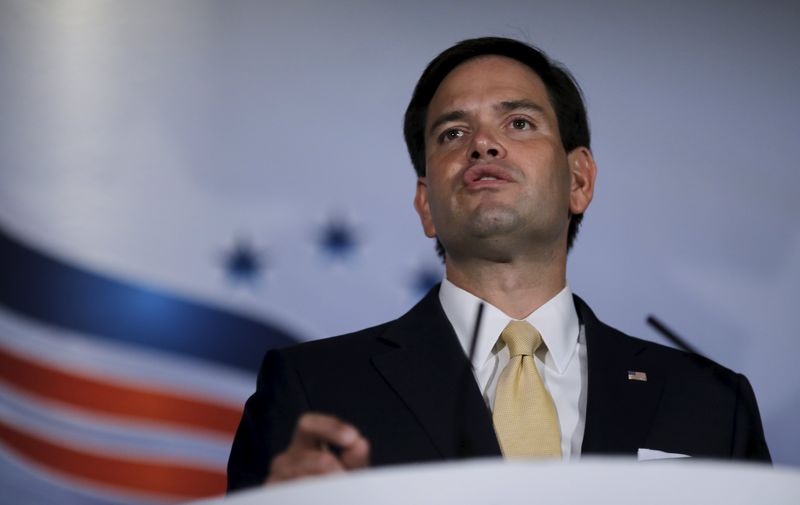Investing.com’s stocks of the week
By James Oliphant
CHICAGO (Reuters) - Republican presidential candidate Marco Rubio called for an overhaul of the U.S. higher education system on Tuesday, saying colleges were operating as a "cartel" and not meeting the needs of students or the economy.
"We do not need timid tweaks to the old system. We need a holistic overhaul," Rubio said in a policy speech in Chicago. "We need to change how we provide degrees, how those degrees are accessed, how much that access costs, how those costs are paid, and even how those payments are determined."
The speech was part of a move by the U.S. senator from Florida to raise his visibility on the campaign trail after focusing on Senate business recently. Rubio is one of 14 declared candidates vying to represent the Republican Party in the November 2016 election.
It also gave Rubio the chance to expound on what has become his candidacy's central theme: preparing America for a future shaped by globalization, automation, and rapid technological change.
Rubio's remarks were "very much an effort to win the support of middle class, moderate Americans who play a key role in general elections," said Jesse Rhodes, a professor of political science at the University of Massachusetts Amherst.
Rubio warned that the path to prosperity for the American middle class has narrowed not as a result of a cyclical, self-correcting downturn. "It is born of a fundamental transformation to the very nature of our economy."
To that end, Rubio has embraced rhetoric that sometimes sounds atypical of conservative candidates: proposing a child tax credit that he calls pro-family, calling for subsidies to assist minimum-wage workers, and, as he emphasized on Tuesday, pushing for a new approach to higher education that is more grounded in teaching high-level skills that will enable graduates to compete in a global business environment.
Because of the current the four-year university system, he said, "many young people are graduating with mountains of debt for degrees that will not lead to jobs, and many who need higher education the most – such as single parents and working adults – are left with few options that fit their schedules and budgets," Rubio said.
To break up what he called the higher-education "cartel," Rubio pledged to create a new accreditation process that would allow low-cost providers, perhaps largely online, to compete with established schools.
"There's no question that accreditation needs to be reformed," said Barmak Nassirian, policy director for the American Association of State Colleges and Universities. "But the simplistic charge that it's just a cartel, that it's only interested in keeping insiders in and the outsiders out, that's obviously too extreme."
Rubio, himself saddled with student loans as a college graduate, wants students to be allowed to repay loans based on their postgraduate incomes. He also wants to allow investors to pay a student's tuition in return for a percentage of the student's income after graduation.
He has called for colleges to tell potential students expected salaries for given degrees before students commit themselves to a major.
After the speech, Rubio left for a three-day trip to Iowa, an early voting state. Social conservatives such as Wisconsin Governor Scott Walker, who is expected to announce his candidacy next week, populist candidate Ben Carson, and Senator Rand Paul of Kentucky have appeared to hold an early advantage in Iowa.
